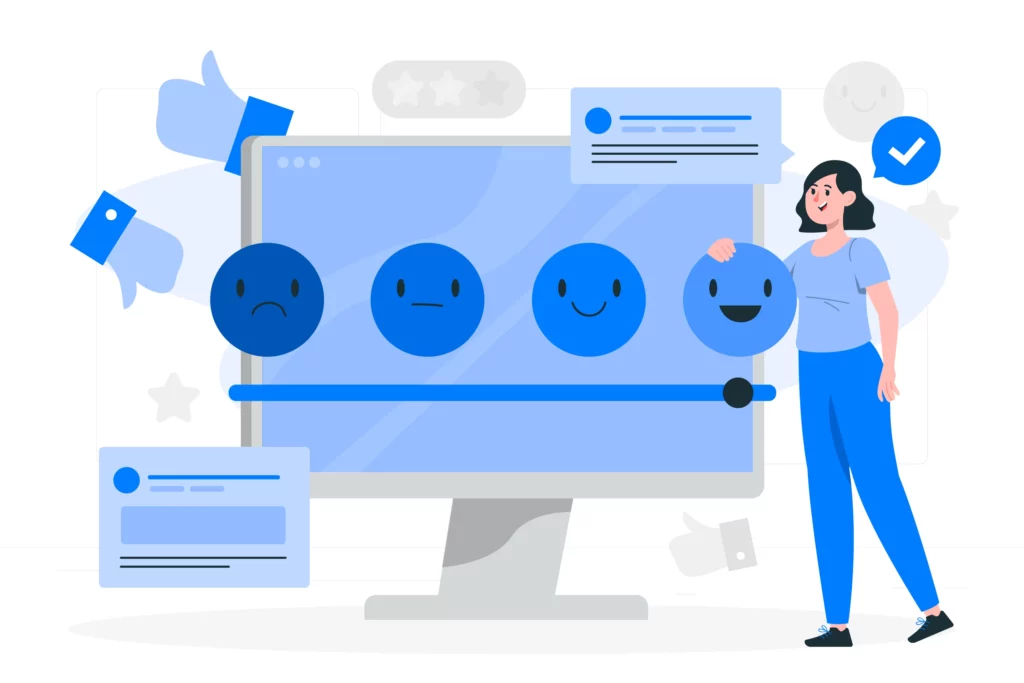
Damilola Oyetunji
Content Writer at Chatway.
Quickly respond to customer and visitor inquiries via live chat
Personalize the chat widget to match your business's style and branding
Stay updated on all incoming messages with email and push notifications
Improve the way your team works with chat assignments and private notes
Provide support on the go with Chatway's mobile apps for iOS and Android devices
Categorize and label conversations using specific criteria for personalized support
Interact with visitors in their preferred language, supporting 20+ languages
Use Chatway live chat on multiple platforms such as Shopify, Wix, Duda etc
Get insights into your support activities to better understand customer interactions
Centralize chats from Messenger and email into a single dashboard
Customer Service,Live Chat - 8 Mins READ
Content Writer at Chatway.

Imagine this: You’re trying to troubleshoot a new app, facing a confusing error message, and the support line is buzzing with busy signals. Frustration mounts as minutes tick by. Sound familiar? Your customers also crave immediate answers and self-service solutions, and when they don’t get it, frustration sets in. However, such scenarios can be prevented with a knowledge base.
But is it just a fancy FAQ section? Absolutely not. This article explores the benefits it offers, transforming both the customer experience and your support operations. We’ll explore how a well-crafted knowledge base can empower customers, streamline workflows, and boost satisfaction, leaving everyone feeling empowered and informed.

A knowledge base is a centralized repository or database that contains organized information, data, documents, and resources pertaining to a particular subject, product, or service. It serves as a storehouse of knowledge that can be accessed, searched, and utilized by individuals or systems to support decision-making, problem-solving, learning, and other activities. Klutch is a great knowledge base software option to explore.

Knowledge bases can be categorized into two major categories namely – Internal and External Knowledge Base.
An internal knowledge base is like a big library of information that a company keeps just for its own employees. It’s where they store all sorts of helpful stuff like guides, rules, how-to documents, and other things that help everyone do their jobs better. The main idea is to make it easy for employees to find what they need quickly, so they can work smarter and solve problems faster. It’s kind of like having a shared brain for the whole company.
An external knowledge base is like a digital library that a company makes available to its customers or users. It contains useful information, guides, FAQs, and troubleshooting tips about the company’s products or services.
The purpose of an external knowledge base is to provide customers with easy access to information that helps them understand and use the products or services effectively. It serves as a self-service resource where customers can find answers to common questions, learn how to troubleshoot problems, and get guidance on using the company’s offerings.
External knowledge bases are typically hosted online and can be accessed through the company’s website or other digital communication channels like live chat. They aim to enhance the customer experience by providing timely and relevant information, reducing the need for customers to contact support teams for assistance.

Knowledge Bases acts as singular source for all important data, documents, and knowledge across an organization. It consolidates scattered information from diverse sources like documents, databases, and systems, into one easily accessible location. This centralization eliminates redundant efforts, breaks down data silos, and promotes consistency and accuracy throughout the organization. By providing access to a centralized repository, teams streamline information retrieval, encourage collaboration, and cultivate a culture of knowledge sharing and transparency.
Empowering customer support agents with a comprehensive knowledge base significantly reduces resolution time for customer queries and issues. Agents can utilize pre-existing solutions, templates, and canned responses to promptly and effectively address inquiries. Access to relevant information helps agents avoid unnecessary escalations, repetitive research, and delays in providing assistance. This reduction in resolution time enhances customer satisfaction, builds trust, and fosters brand loyalty by delivering timely and responsive support experiences.
Standardized responses and solutions guarantee consistent and accurate information across all support channels. Businesses can achieve this by documenting best practices, approved procedures, and predefined responses within the knowledge base, promoting uniformity in communication and problem-solving. This approach minimizes the risk of misinformation, confusion, and inconsistencies in customer interactions, thereby enhancing trust and credibility. Furthermore, standardized responses facilitate training for new agents, ensure compliance with company policies, and reinforce brand messaging across all customer touchpoints.
Human error poses a challenge in customer support, resulting in inaccuracies and inconsistencies. A knowledge base mitigates such errors by offering clear guidelines, procedural checklists, and error-proof workflows. Agents minimize mistakes by adhering to standardized processes and validated solutions from the knowledge base. Moreover, the knowledge base integrates feedback loops and quality assurance mechanisms to proactively identify and rectify errors, ensuring continuous improvement and adherence to service standards.
In today’s omnichannel world, customers demand seamless experiences across various support channels, from phone to website chat and social media. A knowledge base facilitates uniformity by granting agents consistent access to information and resources. Centralizing customer data and interaction history enables personalized support experiences regardless of the channel. Consistency fosters loyalty, decreases churn, and enhances brand reputation by showcasing reliability, professionalism, and responsiveness across all touchpoints.
Providing customers with tools for self-help involves offering accessible resources within the knowledge base, such as FAQs, troubleshooting guides, tutorials, manuals, and interactive tools, enabling them to find solutions independently. This empowerment encourages autonomy, efficiency, and convenience in the customer service experience, allowing customers to learn at their own pace, explore additional features, and gain deeper insights into products or services, enhancing their sense of empowerment and confidence.
Empowering self-service capabilities leads to a reduction in ticket volume by deflecting routine inquiries and common issues away from frontline support channels. Customers who can find answers independently are less likely to initiate support tickets, optimizing resource allocation, prioritizing high-impact issues, and improving operational efficiency. Reducing ticket volume enables support agents to focus on more complex interactions, resulting in higher customer satisfaction and retention rates.
Self-service capabilities enable customers to access immediate solutions and resolutions to their queries, enhancing satisfaction levels through convenience and efficiency. Instant resolution contributes to positive customer experiences, strengthening brand loyalty, encouraging repeat business, and referrals. By offering self-service options, businesses demonstrate their commitment to customer empowerment, responsiveness, and customer-centricity.

A knowledge base serves as a comprehensive repository of training materials, documentation, and resources essential for agent onboarding and ongoing training initiatives, housing instructional guides, modules, process documentation, and best practices tailored to specific products, services, and processes. Centralizing training materials ensures consistency, minimizes reliance on ad-hoc sessions, and facilitates self-paced learning, empowering agents to acquire relevant skills, deepen product knowledge, and deliver high-quality service experiences.
The structured and accessible nature of the knowledge base accelerates the learning curve for new agents, providing readily available resources and guidance to familiarize themselves with company policies, product specifications, and troubleshooting procedures, expediting assimilation into roles, reducing ramp-up time, and enhancing team performance.
Knowledge base also fosters continuous improvement through feedback mechanisms, allowing agents to contribute insights, suggestions, and updates, ensuring dynamic, responsive, and aligned content that drives continuous improvement in support operations while fostering a culture of collaboration, empowerment, and ownership among agents.
Implementing a knowledge base for customer support can result in substantial cost reductions by minimizing the need for costly human intervention and support resources. Self-service options provided through the knowledge base empower customers to find solutions independently, thereby decreasing the volume of support tickets and inquiries requiring agent assistance. With fewer support tickets to manage, organizations can allocate resources more efficiently, streamline workflows, and reduce staffing needs, ultimately lowering support-related expenses. Moreover, centralizing knowledge and standardizing support processes enable organizations to identify opportunities for automation and optimization, further reducing operational costs while upholding service quality standards.
A well-structured knowledge base equips support agents with the necessary tools, information, and resources to swiftly and effectively resolve customer issues. By granting agents access to a centralized repository of knowledge and best practices, organizations enable them to operate more efficiently, minimize downtime, and optimize productivity. Agents leverage pre-existing solutions, templates, and standardized responses within the knowledge base to streamline workflows and prioritize high-value interactions requiring human expertise. This enhanced productivity results in faster resolution times, heightened customer satisfaction, and improved agent morale, ultimately driving superior business outcomes and ROI.
Investing in a knowledge base for customer support reflects a long-term commitment to enhancing customer satisfaction and fostering loyalty. By delivering timely, accurate, and consistent support experiences through the knowledge base, organizations strengthen relationships, build trust, and differentiate themselves from competitors. Satisfied and loyal customers are more likely to stay engaged with the brand, make repeat purchases, and advocate for the organization through word-of-mouth referrals and positive reviews. Ultimately, the cumulative effect of improved customer satisfaction and loyalty results in tangible business benefits, including increased customer lifetime value, higher retention rates, and enhanced brand reputation, ensuring a positive return on investment for the organization over time.
In conclusion, the implementation of a knowledge base for customer support offers a myriad of benefits that not only streamline processes but also improve customer satisfaction and loyalty. By centralizing information, empowering customers, and enabling support agents to deliver efficient assistance, businesses can navigate through complexities and promote meaningful connections with their customers.
However, the journey towards optimal customer support doesn’t end with establishing a knowledge base; it requires continuous refinement and adaptation to meet evolving needs and challenges. Embracing technologies like live chat can further elevate the support experience, providing real-time assistance and fostering deeper engagement.
By incorporating this communication tool alongside your knowledge base, you’ll create a seamless support ecosystem that not only meets but exceeds customer expectations. Take the first step today and sign up on Chatway live chat to kick start your journey to improving your customer support experience.

Content Writer at Chatway.

Live Chat - 7 Mins READ
Content Writer at Chatway.

Live Chat - 6 Mins READ
Content Writer at Chatway.